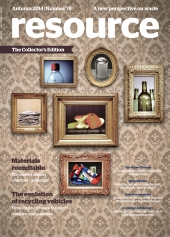A new Silo mentality
One of the newest entrants to the UK restaurant scene, Silo, which opened its doors in Brighton in October, is attempting to forge a path that goes beyond zero waste, a thorough sustainability agenda through what founder and chef Douglas McMaster describes as a ‘pre-industrialised food system’.
Working in partnership with Brighton University, McMaster plans to set the bar for sustainability in the restaurant industry. After 12 years working around the world in fine dining, he was inspired to open the prototype for Silo in Melbourne, and he tells me what motivated him to bring the challenge to the UK: “It’s about taking back what’s gone wrong in the last 50 years of modernised food, the processing and packaging, artificial products and chemicals. All these elements of the food industry are ultimately invading our bodies and raising the level of intolerances left, right and centre.
“We’re trying to flip the switch, and offer a ‘pre-industrial’ food system. One which is sustainably sourced, one which is local, pure and whole, which is processed on site and offers the nutrients and vitamins and minerals that natural ingredients do have but which are denatured in the current food industry.”
McMaster takes pride in sourcing ingredients locally by developing relationships with suppliers, often creating his own, unique, supply chain agreements for the restaurant. He’s also keen on sourcing non-native ingredients and foods in sustainable (and innovative) ways: “There’s a group of modern day hippie pirates – the Tres Hombres – who travel around the world on a sailboat and they have different parts of the world where they make different products. They make rum in the Caribbean, chocolate in Costa Rica, their own brand of coffee; so it’s all ethical and sustainable.
“We’ve arranged to receive the natural wines, coffees and fair trade chocolate – and they’ll be sailing into Brighton Marina. It’s amazing!”
With Silo, thought has been given to the whole process, with a view to, as McMaster calls it on his blog, ‘designing back to front, always with the bin in mind’, although in this case, there is no bin – just an on-site compost machine, which helps close the loop and eliminate food waste, especially the scraps from plates that customers don’t want to take home in a doggy bag.
 This article was taken from Issue 78
This article was taken from Issue 78It’s a step beyond most restaurants, yet far from the only innovation McMaster has implemented. He talks about eliminating the need to produce waste, never mind recycling: “Water is the most considered element in our restaurant… A company developed this electrolysed water machine, when surgeons in Japan wanted something natural to clean an open wound that could prevent and reduce the risk of contamination and infection. It is literally just tap water that goes through electrolysis, which splits the pH to acid and alkali instantly, and that process kills 99.99 per cent of bacteria. So you’ve got water which is more hygienic than hand soap! Essentially, we never need to buy cleaning products ever again in our restaurant.
“We’re talking about thousands of containers full of cleaning products being literally wiped away with this innovation that’s on site.”
A great deal of packaging waste disappears through this technological innovation, while returning to basics in other areas, such as making as much food as possible on site and having suppliers deliver produce in reusable crates and packaging, also achieves the same end. The new restaurant has only six seasonal staple dishes on the menu, which includes just one meat dish, one fish, one vegan and a ‘wild card’. “We’re milling flour, rolling oats, churning butter, using raw milk, growing mushrooms, the whole thing, so it’s all very primitive in conception”, McMaster explains.
His vision for Silo is an impressive investment in sustainability for the food industry – and it’s a mentality others might do well to look to for inspiration.






